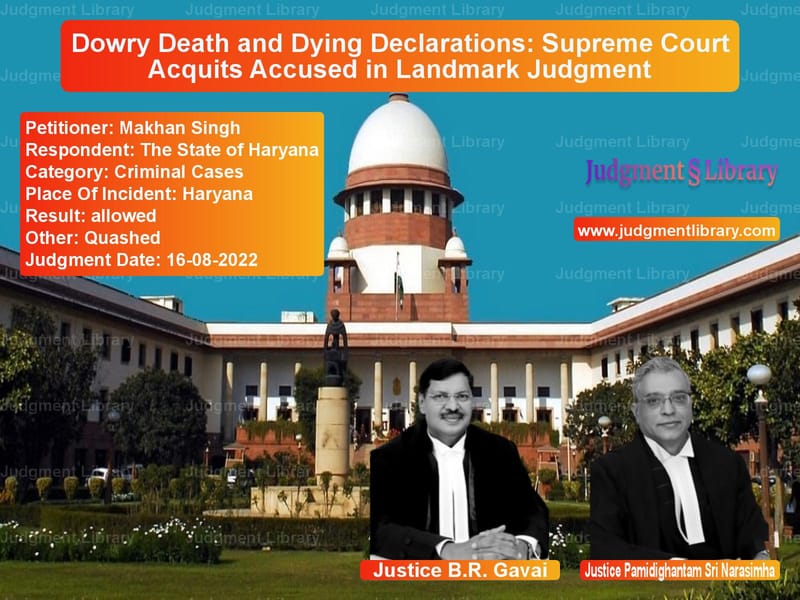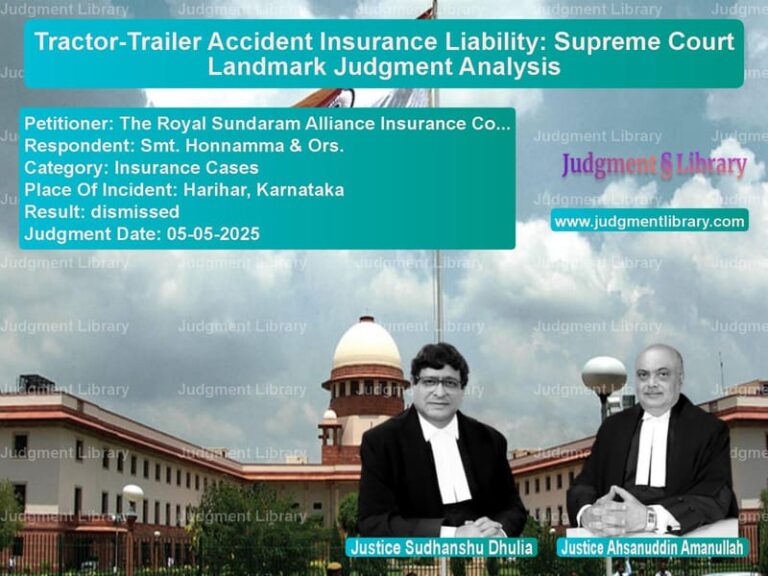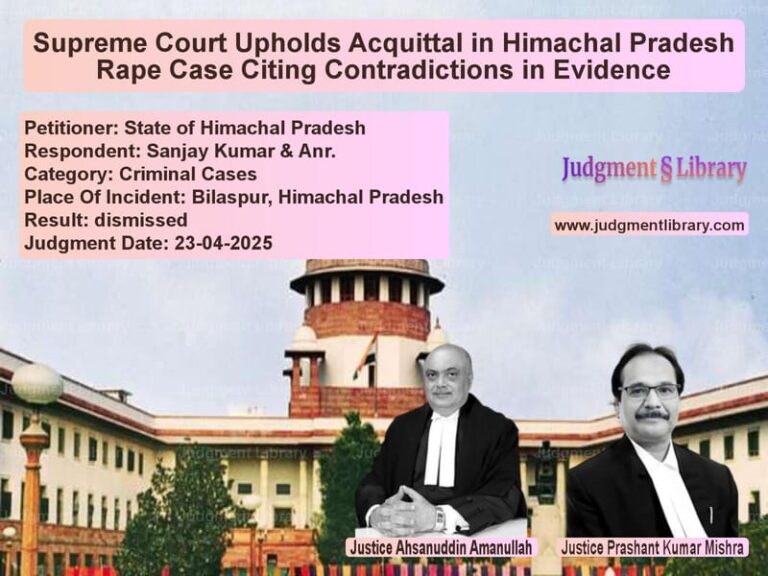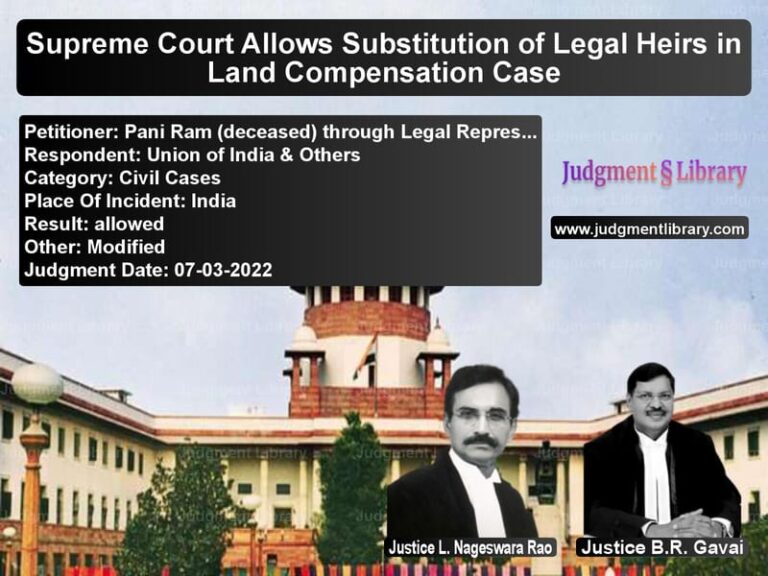Dowry Death and Dying Declarations: Supreme Court Acquits Accused in Landmark Judgment
The Supreme Court of India recently delivered a crucial judgment in the case of Makhan Singh vs. The State of Haryana, where the accused was acquitted of charges under Section 304-B of the Indian Penal Code (IPC) related to dowry death. The case hinged on conflicting dying declarations of the deceased and the reliability of the prosecution’s evidence. The judgment provides significant legal insights into the treatment of multiple dying declarations and their admissibility in criminal trials.
Background of the Case
The case involved the tragic death of Manjit Kaur, who was married to the appellant, Makhan Singh, on January 28, 1996. According to the prosecution, the accused had persistently demanded dowry from the deceased’s family. Initially, an amount of ₹30,000 was paid to Makhan Singh. Later, he allegedly demanded ₹2 lakhs, which he used to travel to Moscow. After returning in March 1998, he further demanded ₹6 lakhs, stating that he intended to go to the USA. Unable to bear the torture, Manjit Kaur allegedly consumed poison on April 21, 1998.
She was first taken to the Community Health Centre, Ladwa, then referred to L.N.J.P. Hospital, Kurukshetra, and finally admitted to a private nursing home run by Dr. H.K. Sobti. Her dying declarations were recorded by two different judicial magistrates. She succumbed to her injuries on May 9, 1998, leading to the registration of an FIR against Makhan Singh.
Arguments by the Petitioner (Makhan Singh)
- The appellant’s counsel argued that the trial court and the High Court overlooked the first dying declaration (Ex. DO/C), in which the deceased stated that she had consumed poison mistakenly.
- It was contended that the second dying declaration (Ex. PE), recorded three days later, was influenced by the deceased’s parents, who instigated her to falsely implicate her husband.
- He further submitted that in cases of conflicting dying declarations, the accused is entitled to the benefit of the doubt.
Arguments by the Respondent (State of Haryana)
- The prosecution argued that the second dying declaration should be relied upon as it was recorded voluntarily.
- The State contended that the first dying declaration was influenced by the presence of the accused.
- It was argued that the concurrent findings of the lower courts should not be interfered with.
Supreme Court’s Observations and Ruling
Legal Principles Governing Dying Declarations
The Court referred to several judgments, including Lakhan v. State of Madhya Pradesh, where it was held that a dying declaration can be the sole basis for conviction if found reliable. The judgment reiterated:
“…the court is required to examine whether the dying declaration is true and reliable; whether it was recorded at a time when the deceased was fit physically and mentally to make the declaration; whether it was made under any tutoring, duress, or prompting.”
Conflicting Dying Declarations
The Supreme Court noted that two dying declarations were recorded—one by Ms. Vani Gopal Sharma (DW-1) and another by Ms. Kanchan Nariala (PW-6). The first declaration exonerated the accused, stating that she mistakenly consumed a green-colored medicine. The second declaration, recorded three days later, implicated the accused and his family.
The Court examined the reliability of both dying declarations and concluded that the first declaration was more credible because:
- It was recorded immediately after the incident.
- A medical fitness certificate was obtained before recording the statement.
- The declaration was consistent and was endorsed by Dr. Sobti.
On the other hand, the second declaration was found to be unreliable because:
- It was recorded after three days, during which the deceased’s family was present.
- No medical fitness certificate was obtained before recording it.
- There was a strong possibility of external influence.
Benefit of the Doubt
The Court observed that the trial court had acquitted the parents of the accused on the same evidence but convicted the appellant. The Supreme Court held that this was inconsistent, stating:
“In any case, the benefit of doubt which has been given to the other accused by the trial court ought to have been equally given to the present appellant when the evidence was totally identical against all three accused.”
Final Judgment
The Supreme Court allowed the appeal, setting aside the judgments of the High Court and trial court. The appellant, Makhan Singh, was acquitted of all charges under Section 304-B IPC.
Impact of the Judgment
This judgment reinforces the legal principles regarding dying declarations and provides clarity on how courts should treat conflicting statements from a deceased victim. Key takeaways include:
- Reliability of Dying Declarations: A dying declaration should be recorded without external influence and preferably with a medical fitness certificate.
- Multiple Dying Declarations: When there are inconsistencies, the courts must carefully analyze which declaration is more reliable.
- Benefit of the Doubt: If two accused are acquitted on the same evidence, the third accused cannot be convicted without additional proof.
- Judicial Fairness: The ruling emphasizes the importance of ensuring that an accused is not wrongfully convicted based on weak or unreliable evidence.
This case sets an important precedent for criminal trials, particularly those involving dowry deaths, where dying declarations play a crucial role in determining guilt or innocence.
Petitioner Name: Makhan Singh.Respondent Name: The State of Haryana.Judgment By: Justice B.R. Gavai, Justice Pamidighantam Sri Narasimha.Place Of Incident: Haryana.Judgment Date: 16-08-2022.
Don’t miss out on the full details! Download the complete judgment in PDF format below and gain valuable insights instantly!
Download Judgment: makhan-singh-vs-the-state-of-haryana-supreme-court-of-india-judgment-dated-16-08-2022.pdf
Directly Download Judgment: Directly download this Judgment
See all petitions in Dowry Cases
See all petitions in Suicide Cases
See all petitions in Judgment by B R Gavai
See all petitions in Judgment by P.S. Narasimha
See all petitions in allowed
See all petitions in Quashed
See all petitions in supreme court of India judgments August 2022
See all petitions in 2022 judgments
See all posts in Criminal Cases Category
See all allowed petitions in Criminal Cases Category
See all Dismissed petitions in Criminal Cases Category
See all partially allowed petitions in Criminal Cases Category







